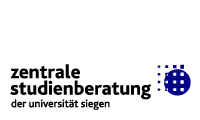Zentrale Studienberatung
im F-S Gebäude
Sandstraße 16-18
57072 Siegen
Erreichbarkeit der
studentischen Hotline:
0271 740-2712
Mo - Do: 9 - 16 Uhr
Fr: 9 - 12 Uhr
Mail:
info.studienberatung[at]
zsb.uni-siegen.de
Terminvereinbarung für eine Beratung über:
0271 740-2712
International Students
You find information about the admission procedure here:
STARTING
Impressum
Computer Science

Short Information
| Restricted
admission |
Regular
study time |
Winter
semester |
Summer
semester |
|---|---|---|---|
| no | 4 semester | ✔ | ✔ |
Admission procedure
Application required
You can apply here
Degree
Master of Science
More information
Program
website
Study program brochure
Language of instruction
German or English
Deadlines
The study program
The master's program in computer science is research-oriented, deepens core topics in computer science and imparts the ability to (further) develop and properly apply methods and procedures for solving problems in the field of computer science. Another goal is to teach key qualifications such as presentation and moderation skills. The M.Sc. Computer Science aims in particular at enabling students to work scientifically in research and development and to take on responsible leadership positions in software and hardware development projects..
The Master's degree contains a specialization in which a selected area of computer science is studied in depth (36 ECTS lecture modules, project work with 15 ECTS, Master's thesis). The focus must be selected from one of the following specializations:
Embedded Systems (teaching language English) focuses on concepts, development methods and technologies for embedded systems used to control physical devices such as car engines, industrial robots or medical systems. Specific requirements such as real-time capability and reliable operation are of particular importance.
Visual Computing (teaching language English) deals with methods of image generation and image analysis, in particular computer graphics, image processing, visualization, computer vision, pattern recognition, and virtual and augmented reality. These topics play a central role in applications such as quality control, medical image processing and visualization, autonomous robotics, multimedia systems, film and television industry, and computer games. A central methodological aspect, in addition to model-driven approaches, is machine learning, in particular deep learning.
Complex and Intelligent Software Systems (teaching language German and English, only eligible with proven knowledge of German) deals with the deepening of competences from all core areas of computer science. The focus is on design methods and techniques for the systematic development and maintenance of complex software systems using scientific principles and tools, planned procedure models and quantifiable quality goals, as well as methods and techniques of intelligent systems, such as machine learning methods or recommendation algorithms.
Medical Informatics (teaching language German and English, only eligible with proven knowledge of German) provides in-depth training in informatics for applications in medical diagnostics and therapy, as well as the structure of healthcare. Typically, a bachelor's degree with a concentration in medical informatics is required for this program, although informatics bachelor's graduates with other concentrations are offered a transitional model.
Study structure
Compulsory Modules |
||
|
Scientific Working (incl. seminar), Cutting Edge Research (lecture series), Project work, Master thesis |
||
Core Modules |
||
|
Four modules from the following selection:
Software Engineering II, Modeling and Animation
(*), Embedded Systems (*), Computer
Architectures II (*), Parallel Processing (*),
Computer Networks II, Advanced Logic (*),
Algorithmics I (*), Database Systems II.
|
||
Advanced Modules |
||
|
A total of 6 modules from the chosen area of specialization |
||
Admission requirements
Successful completion of the Bachelor's program in Computer
Science at the University of Siegen with a major corresponding
to the desired specialization or equivalent first professional
qualification. The responsible examination board decides on the
content-related suitability of the degree.
The current (subject) examination regulations always
apply.
Languages
Proven knowledge of German or English
Study organization
(Subject) Examination Regulations/Course of
Studies/Module Handbooks
(Subject) examination regulations (FPOs) define the basic
structures of a degree program (e.g. admission requirements and
contents to be studied). For students, the current version of
an FPO automatically applies when they enroll in the first
subject-related semester.
The respective study plan represents the recommended exemplary
course of studies in the individual subjects and is part of an
FPO.
Supplementary regulations and detailed information for each
module to be studied can be found in the module handbooks (e.g.
requirements for taking a written examination or information on
the content of the modules/courses, ...).
Before the start of the lecture period, we recommend that you
at least take a look at the study plan of your degree program
so that you know which modules are scheduled for the start of
your studies.


